英语专业八级考试试题附听力4
专业英语八级(听力)模拟试卷320(题后含答案及解析)
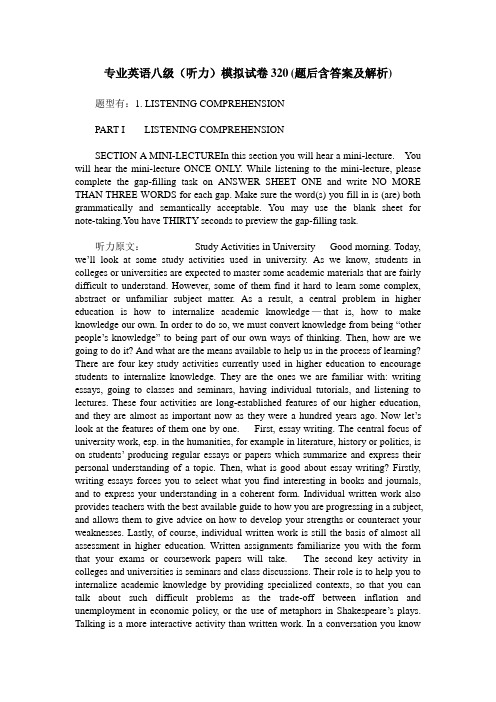
专业英语八级(听力)模拟试卷320(题后含答案及解析)题型有:1. LISTENING COMPREHENSIONPART I LISTENING COMPREHENSIONSECTION A MINI-LECTUREIn this section you will hear a mini-lecture. You will hear the mini-lecture ONCE ONLY. While listening to the mini-lecture, please complete the gap-filling task on ANSWER SHEET ONE and write NO MORE THAN THREE WORDS for each gap. Make sure the word(s) you fill in is (are) both grammatically and semantically acceptable. You may use the blank sheet for note-taking.You have THIRTY seconds to preview the gap-filling task.听力原文:Study Activities in University Good morning. Today, we’ll look at some study activities used in university. As we know, students in colleges or universities are expected to master some academic materials that are fairly difficult to understand. However, some of them find it hard to learn some complex, abstract or unfamiliar subject matter. As a result, a central problem in higher education is how to internalize academic knowledge—that is, how to make knowledge our own. In order to do so, we must convert knowledge from being “other people’s knowledge” to being part of our own ways of thinking. Then, how are we going to do it? And what are the means available to help us in the process of learning? There are four key study activities currently used in higher education to encourage students to internalize knowledge. They are the ones we are familiar with: writing essays, going to classes and seminars, having individual tutorials, and listening to lectures. These four activities are long-established features of our higher education, and they are almost as important now as they were a hundred years ago. Now let’s look at the features of them one by one. First, essay writing. The central focus of university work, esp. in the humanities, for example in literature, history or politics, is on students’producing regular essays or papers which summarize and express their personal understanding of a topic. Then, what is good about essay writing? Firstly, writing essays forces you to select what you find interesting in books and journals, and to express your understanding in a coherent form. Individual written work also provides teachers with the best available guide to how you are progressing in a subject, and allows them to give advice on how to develop your strengths or counteract your weaknesses. Lastly, of course, individual written work is still the basis of almost all assessment in higher education. Written assignments familiarize you with the form that your exams or coursework papers will take. The second key activity in colleges and universities is seminars and class discussions. Their role is to help you to internalize academic knowledge by providing specialized contexts, so that you can talk about such difficult problems as the trade-off between inflation and unemployment in economic policy, or the use of metaphors in Shakespeare’s plays. Talking is a more interactive activity than written work. In a conversation you knowimmediately how effectively you are expressing a viewpoint, and can modify what you are saying in response to people’s reactions. In addition, a normal programme of between ten and twenty-five classes will cover far more topics in one subject than you can hope to manage in your written work. Participating in flexible conversations across this range of issues also allows you to practise using the broader knowledge gained from other key activities such as lectures. Now, let’s take a look at another activity: individual tutorials. Discussions between a teacher and one or two students are used in many colleges as a substitute for, or a supplement to, group discussions in classes, like those mentioned before. Tutorials can range from direct explanations by the teacher in a subject, to flexible conversational sessions which at their best are very effective in stimulating students’mastery of a body of knowledge. The one-to-one quality of the personal interaction is very important in stimulating acceptance of ideas and producing fruitful interaction. In order to make individual tutorials really work, students should make good preparation beforehand, and during the tutorial, they should also ask questions to keep the ball rolling rather, than, let teachers “talk in a Vacuum”. The last activity is lectures. As we all know, lectures play a large part in most students’timetables and occupy a considerable proportion of teachers’efforts. However, the major difficulty with lectures is that they are not interactive like discussions or tutorials. The lecturer normally talks for the whole time with minimal feed-back from questions. Besides, making notes in lectures while concentrating on the argument being developed is often difficult to some students, esp. when the argument is very complicated. However, having said that, lectures are clearly valuable in several specific ways. They can provide a useful overview—an area map, as it were, to familiarize you with the main landscape features to be encountered during a course. Lecturers typically give much more accessible descriptions of theoretical perspectives in their oral presentations than can be found in the academic literature. Whenever there is a rapid pace of progress in theory or practice, lectures play an indispensable part in letting students know the development immediately, usually several years before the new material is included in textbooks. Lastly, lectures are often very useful in allowing you to see directly how exponents of different views build up their arguments. The cues provided by seeing someone talking in person may seem “irrelevant”, but these cues are important aids to understanding the subject better later. So far, we’ve discussed four study activities and their respective features and roles in higher education. Of course, study activities are not limited to just these four types: there are other activities that are equally important, such as general reading, project learning, etc. We’ll cover them during our next lecture.Study Activities in University In order to help college and university students in the process of learning, four key study activities have been designed and used to encourage them to make knowledge their own.1. essay writing: central focus of university work esp. in thehumanities, e.g. 【T1】______ 【T1】______Benefits: 1)helping to 【T2】______ interesting content in books 【T2】______ and to express understanding 2)enabling teachers to know progress and to offer 【T3】______ 【T3】______ 3)【T4】______ students with exam forms 【T4】______2. seminars and classroom discussion: another form tointernalize knowledge in specialized contextsBenefits: 1)【T5】______ enables you to know the effectiveness of 【T5】______ and others’ response to your speech immediately 2)Within the same period of time, more topics can be dealt with than in 【T6】______ 【T6】______ 3)The use of a broader range of knowledge is encouraged3. individual tutorials: a substitute for group discussionFormat: from teacher 【T7】______ to flexible conversation 【T7】______Benefit: encouraging acceptance of 【T8】______ and producing interaction 【T8】______4. lectures: a most 【T9】______ used study activity 【T9】______Disadvantages: 1)less 【T10】______ than discussions or tutorials 【T10】______ 2)more demanding in 【T11】______ 【T11】______Advantages:1)providing a general 【T12】______ of a subject 【T12】______ under discussion2)offering more easily 【T13】______ versions of a theory 【T13】______3)updating students on 【T14】______ developments 【T14】______4)allowing students to follow different 【T15】______ 【T15】______1.【T1】正确答案:literature//history//politics解析:在谈到论文写作时,原文指出“……大学教学工作,特别是在人文学科例如文学、历史或政治学科方面,重点在于……”,这里的三个例子填入一个即可。
专业英语八级(听力)-试卷205
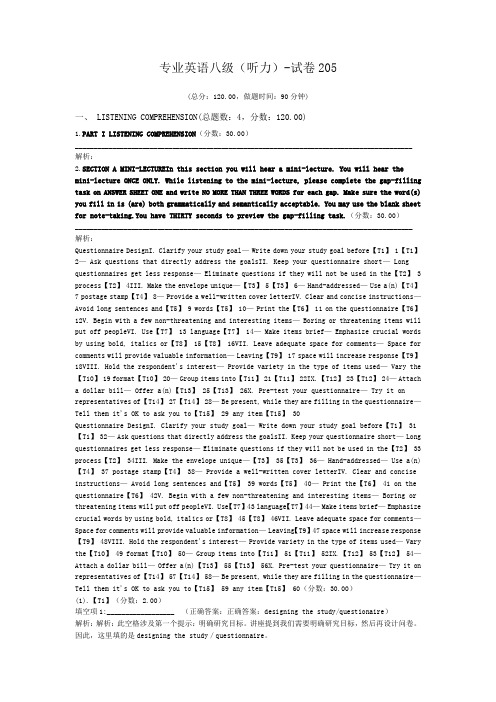
专业英语八级(听力)-试卷205(总分:120.00,做题时间:90分钟)一、 LISTENING COMPREHENSION(总题数:4,分数:120.00)1.PART I LISTENING COMPREHENSION(分数:30.00)__________________________________________________________________________________________ 解析:2.SECTION A MINI-LECTUREIn this section you will hear a mini-lecture. You will hear themini-lecture ONCE ONLY. While listening to the mini-lecture, please complete the gap-filling task on ANSWER SHEET ONE and write NO MORE THAN THREE WORDS for each gap. Make sure the word(s) you fill in is (are) both grammatically and semantically acceptable. You may use the blank sheet for note-taking.You have THIRTY seconds to preview the gap-filling task.(分数:30.00)__________________________________________________________________________________________ 解析:Questionnaire DesignI. Clarify your study goal—Write down your study goal before【T1】1【T1】2— Ask questions that directly address the goalsII. Keep your questionnaire short— Long questionnaires get less response— Eliminate questions if they will not be used in the【T2】 3 process【T2】4III. Make the envelope unique—【T3】5【T3】6—Hand-addressed—Use a(n)【T4】7 postage stamp【T4】8—Provide a well-written cover letterIV. Clear and concise instructions—Avoid long sentences and【T5】 9 words【T5】 10— Print the【T6】 11 on the questionnaire【T6】12V. Begin with a few non-threatening and interesting items— Boring or threatening items will put off peopleVI. Use【T7】 13 language【T7】 14— Make items brief— Emphasize crucial words by using bold, italics or【T8】 15【T8】 16VII. Leave adequate space for comments— Space for comments will provide valuable information—Leaving【T9】17 space will increase response【T9】18VIII. Hold the respondent's interest— Provide variety in the type of items used— Vary the 【T10】19 format【T10】20—Group items into【T11】21【T11】22IX.【T12】23【T12】24—Attach a dollar bill— Offer a(n)【T13】 25【T13】 26X. Pre-test your questionnaire— Try it on representatives of【T14】27【T14】28—Be present, while they are filling in the questionnaire—Tell them it's OK to ask you to【T15】 29 any item【T15】 30Questionnaire DesignI. Clarify your study goal— Write down your study goal before【T1】 31【T1】32—Ask questions that directly address the goalsII. Keep your questionnaire short—Long questionnaires get less response— Eliminate questions if they will not be used in the【T2】 33 process【T2】 34III. Make the envelope unique—【T3】 35【T3】 36— Hand-addressed— Use a(n)【T4】 37 postage stamp【T4】 38— Provide a well-written cover letterIV. Clear and concise instructions— Avoid long sentences and【T5】 39 words【T5】 40— Print the【T6】 41 on the questionnaire【T6】 42V. Begin with a few non-threatening and interesting items— Boring or threatening items will put off peopleVI. Use【T7】43 language【T7】44—Make items brief—Emphasize crucial words by using bold, italics or【T8】45【T8】46VII. Leave adequate space for comments—Space for comments will provide valuable information—Leaving【T9】47 space will increase response 【T9】48VIII. Hold the respondent's interest—Provide variety in the type of items used—Vary the【T10】 49 format【T10】 50— Group items into【T11】 51【T11】 52IX.【T12】 53【T12】 54—Attach a dollar bill— Offer a(n)【T13】 55【T13】 56X. Pre-test your questionnaire— Try it on representatives of【T14】57【T14】58—Be present, while they are filling in the questionnaire—Tell them it's OK to ask you to【T15】 59 any item【T15】 60(分数:30.00)(1).【T1】(分数:2.00)填空项1:__________________ (正确答案:正确答案:designing the study/questionaire)解析:解析:此空格涉及第一个提示:明确研究目标。
大学英语专业八级考试测试试卷(带答案)
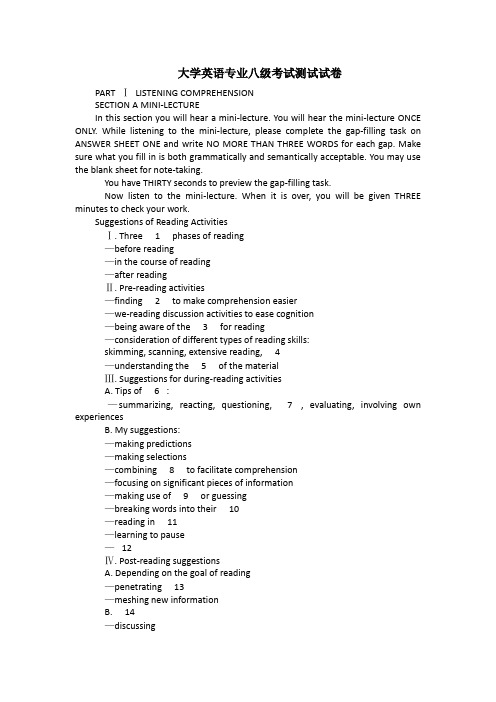
大学英语专业八级考试测试试卷PART ⅠLISTENING COMPREHENSIONSECTION A MINI-LECTUREIn this section you will hear a mini-lecture. You will hear the mini-lecture ONCE ONLY. While listening to the mini-lecture, please complete the gap-filling task on ANSWER SHEET ONE and write NO MORE THAN THREE WORDS for each gap. Make sure what you fill in is both grammatically and semantically acceptable. You may use the blank sheet for note-taking.You have THIRTY seconds to preview the gap-filling task.Now listen to the mini-lecture. When it is over, you will be given THREE minutes to check your work.Suggestions of Reading ActivitiesⅠ. Three 1 phases of reading—before reading—in the course of reading—after readingⅡ. Pre-reading activities—finding 2 to make comprehension easier—we-reading discussion activities to ease cognition—being aware of the 3 for reading—consideration of different types of reading skills:skimming, scanning, extensive reading, 4—understanding the 5 of the materialⅢ. Suggestions for during-reading activitiesA. Tips of 6 :—summarizing, reacting, questioning, 7 , evaluating, involving own experiencesB. My suggestions:—making predictions—making selections—combining 8 to facilitate comprehension—focusing on significant pieces of information—making use of 9 or guessing—breaking words into their 10—reading in 11—learning to pause—12Ⅳ. Post-reading suggestionsA. Depending on the goal of reading—penetrating 13—meshing new informationB. 14—discussing—summarizing—giving questions—filling in 15—writing reading notes—role-playingSECTION B INTERVIEWIn this section you will hear TWO interviews. At the end of each interview, five questions will be asked about what was said. Both the interviews and the questions will be spoken ONCE ONLY. After each question there will be a ten-second pause. During the pause, you should read the four choices of A, B, C and D, and mark the best answer to each question on ANSWER SHEET TWO.You have THIRTY seconds to preview the choices.16、A. Methods to help people get rich. B. Eight steps to make hill use of money.C. Measures to improve the quality of life.D. Basic knowledge of the payoff.17、A. Do a financial checkup. B. Read self-help books.C. Do online banking.D. Organize their daily schedule.18、A. To have online access. B. To have a shoe box.C. To know exactly what access can be used.D. To know the condition of income.19、A. Tracking on the online banking. B. Tracking with debit cards or credit cards.C. Tracking through checking account.D. Tracking with a joint account.20、A. For small purchases. B. For major purchases.C. For household expenses.D. For mortgage payment.21、A. Because the gene has been passed down before they died.B. Because their families and relatives had similar gene.C. Because the gene had to protect people in the past and today.D. Because the gene has been passed down by skipped generation.22、A. Ten minutes before we go indoor.B. Ten minutes after exposing to the sun.C. The first ten minutes when go out in the sun.D. As soon as we go out in the sun.23、A. Because they take advantage of numerous fertilizers.B. Because they are all sprayed with pesticides.C. Because they contain great chemicals and make poisons.D. Because they have been processed before sale.24、A. Because some of them are not used to some kinds of alcohol.B. Because most of them drink fewer times than people of other continents.C. Because half of them lack a gene to break down alcohol efficiently.D. Because some of them suffer from diseases that limit drinking.25、A. It gives conventional account for medicine.B. It introduces the dietary regime for the sick.C. It sees various medical issues in new light.D. It offers tips on survival in the wilderness.PART ⅡREADING COMPREHENSIONSECTION A MULTIPLE-CHOICE QUESTIONSIn this section there are four passages followed by fourteen multiple choice questions. For each multiple choice question, there are four suggested answers marked A, B, C and D. Choose the one that you think is the best answer and mark your answers on ANSWER SHEET TWO.PASSAGE ONE26Cheating in sport is as old as sport itself. The athletes of ancient Greece used potions to fortify themselves before a contest, and their modern counterparts have everything from anabolic steroids and growth hormones to doses of extra red blood cells with which to invigorate theft bodies. These days, however, such stimulants are frowned on, and those athletes must therefore run the gauntlet of organizations such as the World Anti-Doping Agency (WADA., which would rather that athletes competed without resorting to them.27The agencies have had remarkable success. Testing for anabolic steroids (in other words, artficial testosterone) was introduced in the 1970s, and the incidence of cheating seems to have fallen dramatically as a result. The tests, however, are not foolproof. And a study just published in the Journal of Clinical Endocrinology & Metabolism by Jenny Jakobsson Schulze and her colleagues at the Karolinska Institute in Sweden suggests that an individual's genetic make-up could confound them in two different ways. One genotype, to use the jargon, may allow athletes who use anabolic steroids to escape detection altogether. Another may actually be convicting the innocent.28The test usually employed for testosterone abuse relies on measuring the ratio of two chemicals found in the urine: testosterone glucuronide (TG. and epitestosterone glucuronide (EG.. The former is produced when testosterone is broken down, while the latter is unrelated to testosterone metabolism, and can thus serve as a reference point for the test. Any ratio above four of the former to one of the latter is, according to official Olympic policy, considered suspicious and leads to more tests.29However, the production of TG is controlled by an enzyme that is, in turn, encoded by a gene called UGT2B17. This gene comes in two varieties, one of which has a part missing and therefore does not work properly. A person may thus have none, one or two working copies of UGT2B17, since he inherits one copy from each parent. Dr. Schulze guessed that different numbers of working copies would produce different test results. She therefore gave healthy male volunteers whose genes had been examined a single 360mg shot of testosterone (the standard dose for legitimate medical use) and checked their urine to see whether the shot could be detected.30The result was remarkable. Nearly half of the men who carried no functional copies of UGT2B17 would have gone undetected in the standard doping test. By contrast, 14% of those with two functional copies of the gene were over the detection threshold before they had even received an injection. The researchersestimate this would give a false-positive testing rate of 9% in a random population of young men.31Dr. Schulze also says there is substantial ethnic variation in UGT2B17 genotypes. Two-thirds of Asians have no functional copies of the gene (which means they have a naturally low ratio of TG to EG., compared with under a tenth of Caucasians—something the anti-doping bodies may wish to take into account.32In the meantime, Dr. Schulze's study does seem to offer innocents a way of defending themselves. Athletes traveling to Beijing for the Olympic games may be wise to travel armed not only with courage and the "spirit of Olympianism", but also with a copy of their genetic profile, just in case.PASSAGE TWO26Asked what job they would take if they could have any, people unleash their imaginations and dream of exotic places, powerful positions or work that involves alcohol and a paycheck at the same time. Or so you'd think.27None of those appeals to Lori Miller who, as a lead word processor, has to do things that don't seem so dreamy, which include proofreading, spell checking and formatting. But she loves it. "I like and respect nearly all my co-workers, and most of them feel the same way about me," she says. "Just a few things would make it a little better," she says, including a shorter commute and the return of some great people who used to work there. And one more thing: She'd appreciate if everyone would put their dishes in the dishwasher.28It's not a lot to ask for and, it turns out, a surprising number of people dreaming up their dream job don't ask for much. One could attribute it to lack of imagination, setting the bar low or "anchoring," the term referring to the place people start and never move far from. One could chalk it up to rationalizing your plight.29But maybe people simply like what they do and aren't, as some management would have you believe, asking for too much—just the elimination of a small but disproportionately powerful amount of office inanity. That may be one reason why two-thirds of Americans would take the same job again "without hesitation" and why 90% of Americans are at least somewhat satisfied with their jobs, according to a Gallup Poll.30The matters that routinely rank high on a satisfaction scale don't relate to money but "work as a means for demonstrating some sort of responsibility and achievement," says Barry Staw, professor of leadership and communication at University of California, Berkeley's Haas School of Business. "Pay—even when it's important, it's not for what you can buy, it's a validation of your work and approval."31So, money doesn't interest Elizabeth Gray as much as a level playing field. "I like what I do," says the city project manager who once witnessed former colleagues award a contractor, paid for work he never completed, with the title of "Contractor of the Year".32Thus: "My dream job would be one free of politics," she says. "All advancement would be based on merit. The people who really did the work would be the ones who received the credit."40Frank Gastner has a similar ideal: "VP in charge of destroying inane policies." Over the years, he's had to hassle with the simplest of design flaws that would cost virtually nothing to fix were it not for the bureaucracies that entrenched them. So, the retired manufacturer's representative says he would address product and process problems with the attitude, "It's not right; let's fix it now without a committee meeting."41Monique Huston actually has her dream job—and many tell her it's theirs, too. She's general manager of a pub in Omaha, the Dundee Dell, which boasts 650 single-malt scotches on its menu. She visits bars, country clubs, people's homes and Scotland for whiskey tasting. "I stumbled on my passion in life," she says.42Still, some nights she doesn't feel like drinking—or smiling. "Your face hurts," she complains. And when you have your dream job you wonder what in the world you'll do next.43One of the big appeals of a dream job is dreaming about it. Last year, George Reinhart saw an ad for a managing director of the privately owned island of Mustique in the West Indies.44He was lured by the salary ($1 million) and a climate that beat the one enjoyed by his Boston suburb. A documentary he saw about Mustique chronicled the posh playground for the likes of Mick Jagger and Princess Margaret. He reread Herman Wouk's "Don't Stop the Carnival," about a publicity agent who leaves his New York job and buys an island hotel. In April of last year, he applied for the job.45He heard nothing. So last May, he wrote another letter: "I wanted to thank you for providing the impetus for so much thought and fun." He didn't get the job but, he says, he takes comfort that the job hasn't been filled. "So, I can still dream," he adds.46I told him the job had been filled by someone—but only after he said, "I need to know, because then I can begin to dream of his failure."PASSAGE THREE26Israel is a "powerhouse of agricultural technology", says Abraham Goren of Elbit Imaging (EI), an Israeli multinational. The country's cows can produce as much as 37 liters of milk a day. In India, by contrast, cows yield just seven liters. Spotting an opportunity, EI is going into the Indian dairy business. It will import 10,000 cows and supply fortified and flavored milk to supermarkets and other buyers.27So will EI lap up India's milk market? Not necessarily. As the Times of India points out, its cows will ruminate less than 100 miles from the headquarters of a formidable local producer—the Gujarat Co-operative Milk Marketing Federation, otherwise known as Amul. This Farmers' Co-operative spans 2.6m members, collects 6.5m liters of milk a day, and boasts one of the longest-running and best-loved advertising campaigns in India. It has already shown "immense resilience" in the face of multinational competition, says Arindam Bhattacharya of the Boston Consulting Group (BCG.. Its ice-cream business survived the arrival of Unilever; its chocolate milk has thrived despite Nestleacute.28Indeed, Amul is one of 50 firms—from China, India, Brazil, Russia and six other emerging economies—that BCG has anointed as "local dynamos". They areprospering in their home market, are fending off multinational rivals, and are not focused on expanding abroad. BCG discovered many of these firms while drawing up its "global challengers" list of multinationals from the developing world. The companies that were venturing abroad most eagerly, it discovered, were not necessarily the most successful at home.29Emerging economies are still prey to what Harvard's Dani Rodrik has called "export fetishism". International success remains a firm's proudest boast, and with good reason: economists have shown that exporters are typically bigger, more efficient and pay better than their more parochial rivals. "Exporters are better" was the crisp verdict of a recent review of the data.30Countries like India and Brazil were, after all, once secluded backwaters fenced off by high tariffs. Prominent firms idled along on government favors and captive markets. In that era, exporting was a truer test of a company's worth. But as such countries have opened up, their home markets have become more trying places. Withstanding the onslaught of foreign firms on home soil may be as impressive a feat as beating them in global markets.31BCG describes some of the ways that feat has been accomplished. Of its 50 dynamos, 41 are in consumer businesses, where they can exploit a more intimate understanding of their compatriots' tastes. It gives the example of Gol, a Brazilian budget airline, which bet that its cash-strapped customers would sacrifice convenience and speed for price. Many Gol planes therefore depart at odd hours and make several hops to out-of-the-way locations, rather than flying directly.32Similarly astute was India's Titan Industries, which has increased its share of India's wristwatch market despite the entry of foreign brands such as Timex and Swatch. It understood that Indians, who expect a good price even for old newspapers, do not throw their watches away lightly, and has over 700 after-sales centers that will replace straps and batteries.40Exporters tend to be more capital-intensive than their home-bound peers; they also rely more on skilled labor. Many local dynamos, conversely, take full advantage of the cheap workforce at their disposal. Focus Media, China's biggest "out of home" advertising company, gets messages out on flat-panel displays in 85,000 locations around the country. Those displays could be linked and reprogrammed electronically, but that might fall foul of broadcast regulations. So instead the firm's fleet of workers on bicycles replaces the displays' discs and flash-cards by hand.41The list of multinationals resisted or repelled by these dynamos includes some of the world's biggest names: eBay and Google in China; Wal-Mart in Mexico; SAP in Brazil. But Mr. Goren of EI is not too worried about Amul. The market is big enough for everybody, he insists. Nothing, then, is for either company to cry about.PASSAGE FOUR26It is hard for modern people to imagine the life one hundred years ago. No television, no plastic, no ATMs, no DVDs. Illnesses like tuberculosis, diphtheria, pneumonia meant only death. Of course, cloning appeared only in science fiction. Not to mention, computer and Internet.27Today, our workplace are equipped with assembly lines, fax machines, computers. Our daily life is cushioned by air conditioners, cell phones. Antibiotics helped created a long list of miracle drugs. The by-pass operation saved millions. The discovery of DNA has revolutionized the way scientists think about new therapies. Man finally stepped on the magical and mysterious Moon. With the rapid changes we have been experiencing, the anticipation for the future is higher than ever.28A revolutionary manufacturing process made it possible for anyone to own a car. Henry Ford is the man who put the world on wheels.29When it comes to singling out those who have made a difference in all our lives, you cannot over-look Henry Ford. A historian a century from now might well conclude that it was Henry Ford who most influenced all manufacturing everywhere, even to this day, by introducing a new way to make cars—one, strange to say, that originated in slaughter houses.30Back in the early 1900s, slaughter houses used what could have been called a "disassembly line." That is, the carcass of a slain steer or a pig was moved past various meat-cutters, each of whom cut off only a certain portion. Ford reversed this process to see if it would speed up production of a part of an automobile engine called a magneto. Rather than have each worker completely assemble a magneto, one of its elements was placed on a conveyer, and each worker, as it passed, added another component to it, the same one each time. Professor David Hounshell, of The University of Delaware, an expert on industrial development tells what happened: "The previous day, workers carrying out the entire process had averaged one magneto every 20 minutes. But on that day, on the line, the assembly team averaged one every 13 minutes and 10 seconds per person."31Within a year, the time had been reduced to five minutes. In 1913, Ford went all the way. Hooked together by ropes, partially assembled vehicles were towed past workers who completed them one piece at a time. It wasn't long before Ford was turning out several hundred thousand cars a year, a remarkable achievement then. And so efficient and economical was this new system that he cut the price of his cars in half, to $260, putting them within reach of all those who, up until that time, could not afford them. Soon, auto makers over the world copied him. In fact, he encouraged them to do so by writing a book about all of his innovations, entitled Today and Tomorrow. The Age of the Automobile had arrived. Today, aided by robots and other forms of automation, everything from toasters to perfumes is made on assembly lines.32Edsel Ford, Henry's great-grandson, and a Ford vice president: "I think that my great-grandfather would just be amazed at how far technology has come."40Many of today's innovations come from Japan. Norman Bodek, who publishes books about manufacturing processes, finds this ironic. On a recent trip to Japan he talked to two of the top officials of Toyota. "When I asked them where these secrets came from, where their ideas came from to manufacture in a totally different way, they laughed, and they said. 'Well. We just read it in Henry Ford's book from 1926: Today and Tomorrow.'"26、The second paragraph implies that testing for anabolic steroids______.(PASSAGE ONE.A. is always accurate and reliableB. is proved to be inaccurateC. may sometimes show inaccuracyD. has helped end doping in sport27、According to official Olympic policy, which of the following ratio between TG and EG is considered suspicious? ______(PASSAGE ONE.A. 1:1.B. 2.5:1.C. 3.3:1.D. 4.5:1.28、Which of the following is NOT true about UGT2B17, according to the passage? ______(PASSAGE ONE.A. None, one or two working copies of UGT2B17 can be found in different people.B. Test results would depend on numbers of working copies of UGT2B17.C. Most Caucasians have no functional copies of UGT2B17.D. Most Asians have no functional copies of UGT2B17.29、Why does the author suggest the athletes bring a copy of their genetic profile to the Olympic Games?______(PASSAGE ONE.A. Because it is required by the Beijing Olympic Games Committee.B. Because it may defend them against unfavorable testosterone test results.C. Because it is one of the ways to show "spirit of Olympianism".D. Because it will help them to perform better in the Olympic Games.30、According to the passage, ______.(PASSAGE TWO)A. many people don't ask for much about their dream jobB. most Americans are not satisfied with their jobsC. Lori Miller is totally satisfied with her current jobD. Loti Miller is not satisfied with her current job at all31、What is the role of the 4th paragraph in the development of the passage? ______(PASSAGE TWO)A. To show that people don't ask for much about their dream job.B. To show that most people in America are satisfied with their jobs.C. To offer supporting evidence to the preceding paragraph.D. To provide a contrast to the preceding paragraphs.32、All the following are mentioned as features of a dream job EXCEPT ______.(PASSAGE TWO)A. demonstrating duty and achievementB. being free of politicsC. making people dream about itD. involving alcohol drinking33、According to the passage, after EI enters the Indian dairy business, ______.(PASSAGE THREE.A. India's milk market will not necessarily be greatly influencedB. India's milk market will be completely lapped upC. Amul will lose in the competition with EID. Unilever and Nestleacute will leave the Indian market34、All of the following are ways to accomplish the feat of withstanding the onslaught of foreign firms on home soil EXCEPT ______.(PASSAGE THREE.A. relying more on skilled laborB. specializing in consumer businessesC. taking advantage of the cheap workforceD. better understanding homeconsumers' tastes35、Which of the following would the author most probably agree? ______(PASSAGE THREE.A. Not all of the developing world's most successful companies are globalizing.B. Companies venturing abroad most eagerly are the most successful at home.C. Local dynamos are the most successful firms all over the world.D. Globalizing is not good for companies in emerging economies.36、To call Henry Ford "the man who put the world on wheels", the author means ______.(PASSAGE FOUR)A. he made quality wheels famous to the whole worldB. he produced cars for free for people all over the worldC. his innovation made it possible for anyone to own a carD. his innovation provided everyone in the world with a car37、The assembly line reduced the time to make a magneto by ______ within a year.(PASSAGE FOUR)A. 20%B. 38%C. 65%D. 75%38、Before assembly line was introduced, the price of a Ford's car was ______.(PASSAGE FOUR)A. $260B. $130C. $520D. $104039、The last paragraph implies that ______.(PASSAGE FOUR)A. Today and Tomorrow provides technological solutions for manufacturersB. Many of the Japanese innovations are inspired by Today and TomorrowC. Today and Tomorrow is more popular among the Japanese than the AmericansD. Today and Tomorrow is a Japanese manufacturing encyclopedia40、SECTION B SHORT ANSWER QUESTIONSIn this section there are eight short answer questions based on the passages in SECTION A. Answer each question in NO more than 10 words in the space provided on ANSWER SHEET TWO.According to the passage, what is the status quo of cheating in sport?(PASSAGE ONE.41、According to the second paragraph, why are the tests for anabolic steroids inconvincible?(PASSAGE ONE.42、What does the phrase "a level playing field" in Paragraph 6 mean?(PASSAGE TWO)43、What's the main idea of the passage?(PASSAGE TWO)44、According to the passage, what's the market orientation of those "local dynamos"?(PASSAGE THREE.45、According to Dani Rodrik, what's the most important achievement for "export fetishism"?(PASSAGE THREE.46、Why do many Gol planes take off at odd hours and fly indirectly?(PASSAGE THREE.47、Where did the idea of assembly line come from?(PASSAGE FOUR)PART ⅢLANGUAGE USAGEThe passage contains TEN errors. Each indicated line contains a maximum of ONE error. In each case, only ONE word is involved. You should proofread the passage and correct it in the following way:For a wrong word, underline the wrong word and write the correct one in the blank provided atthe end of the line.For a missing word, mark the position of the missing word with a "∧" sign and write the wordyou believe to be missing in the blank provided at the end of the line.For an unnecessary word, cross the unnecessary word with a slash "—" and put the word in the blankprovided at the end of the line.Language performance and language acquisition are the twoprinciple concerns of the psychology of language, or psycholinguistics. 48The intensified study of psycholinguistics has produced a considerableamount of literature and some significant advance in our understanding 49of language acquisition. Surprisingly little fundamental researchhas been conducted into the processes of learning a second language.The consequence has been most theories in this field 50are still extrapolating from general theories of human learning 51and behavior or from the recent work in language performance andacquisition. This is not to say that there has been no valuableresearch on language teaching. But this has been concerned about 52the evaluation of different teaching methods and materials, forexample, the use of language laboratories, the use of language drills,the teaching of grammar by different methods.Now, such research is difficult to evaluate, so experiments in 53language teaching suffer from the same set of problems that allcomparative educational experiments suffer from. It is virtuallyimpossible to control all the factors involved in even if we know 54how to identify them in the first place, particularly such factors asmotivation, previous knowledge, aptitude, learning outside the classroom,teacher performance. Consequently the conclusions to be drawnfrom such experiments can, with confidence, be generalized toother 55teaching situations. The results are, strictly spoken, only valid for the 56 learners, teachers and schools in what the experiment took place. 57PART ⅣTRANSLATIONTranslate the following text from Chinese into English. Write your translation on ANSWER SHEET THREE.58、沿着荷塘,是一条曲折的小煤屑路。
专八听力考试题及答案
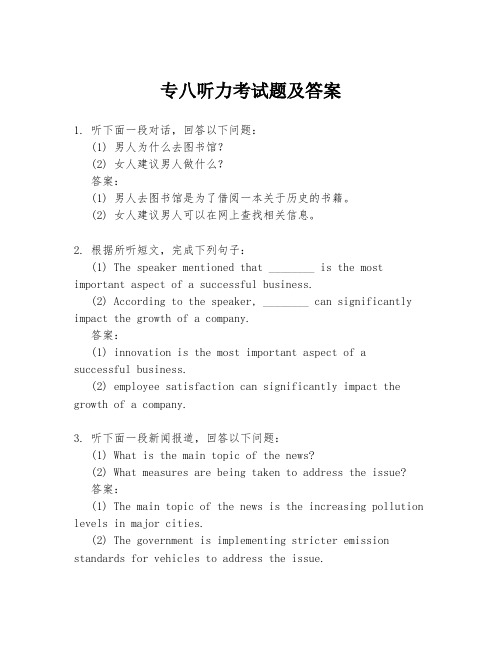
专八听力考试题及答案1. 听下面一段对话,回答以下问题:(1) 男人为什么去图书馆?(2) 女人建议男人做什么?答案:(1) 男人去图书馆是为了借阅一本关于历史的书籍。
(2) 女人建议男人可以在网上查找相关信息。
2. 根据所听短文,完成下列句子:(1) The speaker mentioned that ________ is the most important aspect of a successful business.(2) According to the speaker, ________ can significantly impact the growth of a company.答案:(1) innovation is the most important aspect of a successful business.(2) employee satisfaction can significantly impact the growth of a company.3. 听下面一段新闻报道,回答以下问题:(1) What is the main topic of the news?(2) What measures are being taken to address the issue?答案:(1) The main topic of the news is the increasing pollution levels in major cities.(2) The government is implementing stricter emission standards for vehicles to address the issue.4. 根据所听讲座内容,回答以下问题:(1) What is the speaker's opinion on the role oftechnology in education?(2) What example does the speaker give to illustrate the point?答案:(1) The speaker believes that technology can greatly enhance the learning experience in education.(2) The speaker gives the example of using interactive software in classrooms to make lessons more engaging.5. 听下面一段对话,完成下列句子:(1) The woman is planning to ________ for her vacation.(2) The man suggests ________ as a possible destination.答案:(1) The woman is planning to go hiking for her vacation.(2) The man suggests visiting the national park as a possible destination.6. 根据所听短文,回答以下问题:(1) What is the main reason for the decline in the population of the species discussed?(2) What conservation efforts are mentioned in the article?答案:(1) The main reason for the decline in the population is habitat loss due to urban development.(2) The conservation efforts mentioned includeestablishing protected areas and raising public awareness.7. 听下面一段对话,回答以下问题:(1) Why is the woman upset?(2) What does the man offer to do?答案:(1) The woman is upset because she missed her flight.(2) The man offers to help her rebook another flight.8. 根据所听讲座内容,完成下列句子:(1) The speaker argues that ________ is crucial for maintaining a healthy lifestyle.(2) The speaker also mentions that ________ can lead to various health issues.答案:(1) The speaker argues that regular exercise is crucialfor maintaining a healthy lifestyle.(2) The speaker also mentions that a sedentary lifestyle can lead to various health issues.9. 听下面一段新闻报道,回答以下问题:(1) What is the main focus of the news report?(2) What is the current status of the situation?答案:(1) The main focus of the news report is the ongoing negotiations between two countries.(2) The current status of the situation is that both sides have agreed to continue talks next month.10. 根据所听对话,回答以下问题:(1) What is the man's opinion about the new restaurant?(2) What does the woman think about the food?答案:(1) The man's opinion about the new restaurant is that it is overpriced.(2) The woman thinks the food is delicious but not worth the high price.。
2011年专8真题答案(含听力材料)
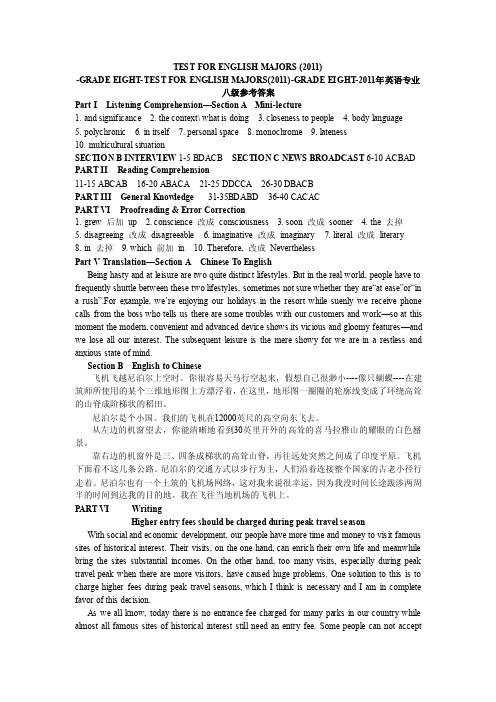
TEST FOR ENGLISH MAJORS (2011)-GRADE EIGHT-TEST FOR ENGLISH MAJORS(2011)-GRADE EIGHT-2011年英语专业八级参考答案Part I Listening Comprehension—Section A Mini-lecture1. and significance2. the context\ what is doing3. closeness to people4. body language5. polychronic6. in itself7. personal space8. monochrome9. lateness10. multicultural situationSECTION B INTERVIEW 1-5 BDACB SECTION C NEWS BROADCAST 6-10 ACBAD PART II Reading Comprehension11-15 ABCAB 16-20 ABACA 21-25 DDCCA 26-30 DBACBPART III General Knowledge 31-35BDABD 36-40 CACACPART VI Proofreading & Error Correction1. grew 后加up2. conscience 改成consciousness3. soon 改成sooner4. the 去掉5. disagreeing 改成disagreeable6. imaginative 改成imaginary7. literal 改成literary8. in 去掉9. which 前加in 10. Therefore, 改成NeverthelessPart V Translation—Section A Chinese To EnglishBeing hasty and at leisure are two quite distinct lifestyles. But in the real world, people have to frequently shuttle between these two lifestyles, sometimes not sure whether they are“at ease”or“in a rush”.For example, we’re enjoying our holidays in the resort while suenly we receive phone calls from the boss who tells us there are some troubles with our customers and work—so at this moment the modern, convenient and advanced device shows its vicious and gloomy features—and we lose all our interest. The subsequent leisure is the mere showy for we are in a restless and anxious state of mind.Section B English to Chinese飞机飞越尼泊尔上空时。
英语专业8级考试满分听力答(5-13)
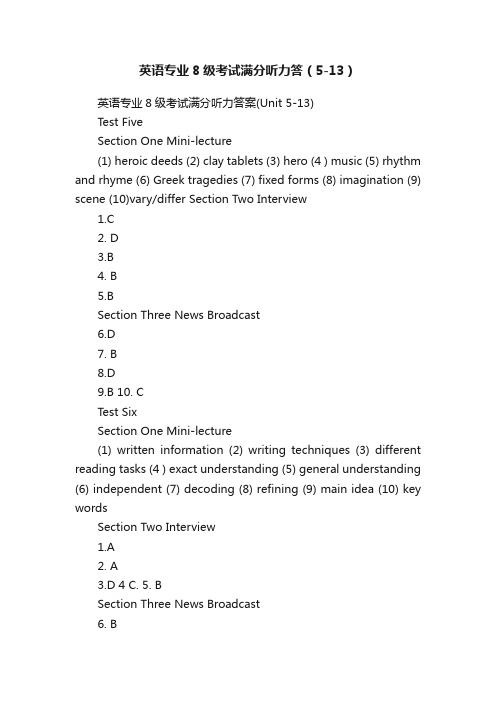
英语专业8级考试满分听力答(5-13)英语专业8级考试满分听力答案(Unit 5-13)Test FiveSection One Mini-lecture(1) heroic deeds (2) clay tablets (3) hero (4 ) music (5) rhythm and rhyme (6) Greek tragedies (7) fixed forms (8) imagination (9) scene (10)vary/differ Section Two Interview1.C2. D3.B4. B5.BSection Three News Broadcast6.D7. B8.D9.B 10. CTest SixSection One Mini-lecture(1) written information (2) writing techniques (3) different reading tasks (4 ) exact understanding (5) general understanding (6) independent (7) decoding (8) refining (9) main idea (10) key wordsSection Two Interview1.A2. A3.D 4 C. 5. BSection Three News Broadcast6. B8.D9.C 10. BTest SevenSection One Mini-lecture(1) lexical items (2) Anglo-Saxon (3) small (4 ) loan words (5) before (6) Latin (7) French (8) Greek (9) direct adoption (10) technicalSection Two Interview1.C2. A3.C4. B5.ASection Three News Broadcast6. B7. C8.A 9 .C 10. ATest EightSection One Mini-lecture(1)variations (2)negotiate (3)underlying (4 ) retrieval (5) recognize/distinguish (6) efficacy (7) attitude (8) Anthropological (9) range (10) processed Section Two Interview1.B2. C3.D4. B5.CSection Three News Broadcast6.C8.A9.A 10. DTest NineSection One Mini-lecture(1) Gold Rush (2) Laundry (3)fishermen (4 ) 1860s (5) first transcontinental railroad (6) descendants (7) strong (8) responsibility (9) education (10) acceptance/recognition Section Two Interview1.C2. A3.B4. D5.CSection Three News Broadcast6.C7. A8.C9.C 10. BTest TenSection One Mini-lecture(1) French (2) the Renaissance (3) borrowed (4 ) American(5)origins(6) the same thing (7) abstraction (8) relationships (9) formality (10) clear and accurateSection Two Interview1. B2. A3.C4.DSection Three News Broadcast6. B7. A8. D9. C 10. CTest ElevenSection One Mini-lecture(1) sound (2) imitation (3) secondary (4 ) heavy fall (5) Semantic (6) metaphor(7) substitution (8) steps/procedures (9) distinguish (10) meaningSection Two Interview1.B2. D3. B4. C5.ASection Three News Broadcast6.A7.D8.A9. B 10.CTest TwelveSection One Mini-lecture(1) Extended (2) advance/promote (3) less (4 ) working outside (5) Equality (6) parents (7) responsible (8) the same person (9) emotional support(10) potentialSection Two Interview2. B3. A4. D5.ASection Three News Broadcast6. B7. C8.C9. B 10. ATest ThirhteenSection One Mini-lecture(1) speculations (2) statistics (3) up-to-date/new (4) make reading entertaining/funny/interesting (5) too limited/too narrow/too insufficient (6) easy to approach/ easy to understand(7) readers/everybody (8) factual evidence (9) representative (10) accurate Section Two Interview1.C 2A . 3. B 4.A 5.DSection Three News Broadcast6. C7. A8.A9. A 10. C。
英语专业八级试题
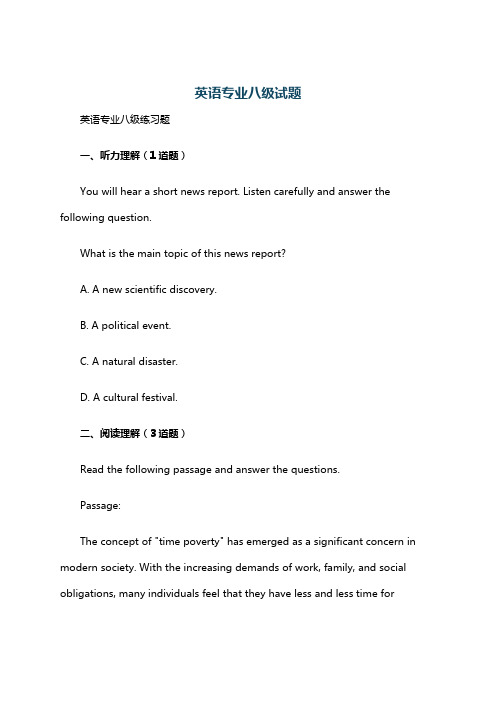
英语专业八级试题英语专业八级练习题一、听力理解(1道题)You will hear a short news report. Listen carefully and answer the following question.What is the main topic of this news report?A. A new scientific discovery.B. A political event.C. A natural disaster.D. A cultural festival.二、阅读理解(3道题)Read the following passage and answer the questions.Passage:The concept of "time poverty" has emerged as a significant concern in modern society. With the increasing demands of work, family, and social obligations, many individuals feel that they have less and less time forthemselves. This phenomenon is not only affecting people's mental health but also their overall quality of life.Question 1: What is "time poverty" according to the passage?A. Being poor and having no time.B. The feeling of having insufficient time due to various demands.C. A new economic concept related to time management.D. The lack of time for work.Question 2: Which of the following is NOT affected by "time poverty" according to the passage?A. Mental health.B. Physical health.C. Quality of life.D. Social relationships.Question 3: The author's attitude towards "time poverty" can be best described as:A. Optimistic.B. Pessimistic.C. Concerned.D. Indifferent.三、语言知识(3道题)1. Choose the correct word to fill in the blank.The committee has made a ______ decision regarding the new project.A. conscienceB. consciousC. consecutiveD. consensus2. Identify the error in the following sentence.I have been waiting here from two hours, but no one has come yet.A. have been waitingB. fromC. butD. has come3. Which of the following sentences uses the subjunctive mood correctly?A. If I was you, I would study harder.B. She demanded that he leaves immediately.C. It is important that we be on time for the meeting.D. I wish I have more money.四、翻译(2道题)1. Translate the following Chinese sentence into English.中国的城市化(urbanization)将会充分释放潜在内需(domestic demand)。
外语类《英语专业考试》专业英语四级《专业英语八级》考试试题及答案解析
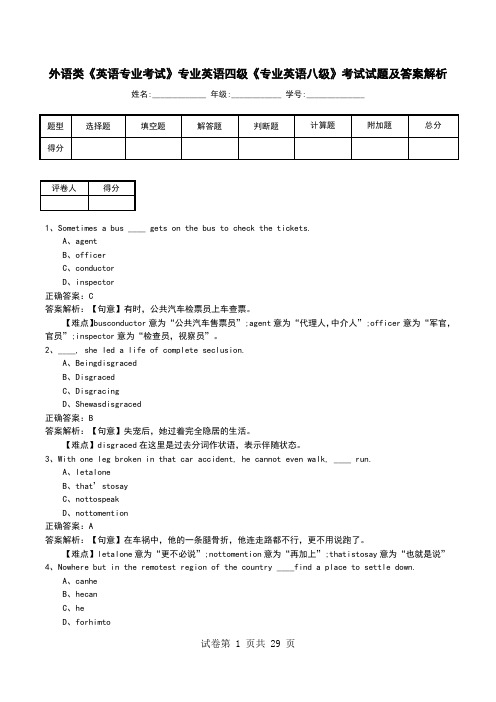
外语类《英语专业考试》专业英语四级《专业英语八级》考试试题及答案解析姓名:_____________ 年级:____________ 学号:______________1、Sometimes a bus ____ gets on the bus to check the tickets.A、agentB、officerC、conductorD、inspector正确答案:C答案解析:【句意】有时,公共汽车检票员上车查票。
【难点】busconductor意为“公共汽车售票员”;agent意为“代理人,中介人”;officer意为“军官,官员”;inspect or意为“检查员,视察员”。
2、____, she led a life of complete seclusion.A、BeingdisgracedB、DisgracedC、DisgracingD、Shewasdisgraced正确答案:B答案解析:【句意】失宠后,她过着完全隐居的生活。
【难点】disgraced在这里是过去分词作状语,表示伴随状态。
3、With one leg broken in that car accident, he cannot even walk, ____ run.A、letaloneB、that’stosayC、nottospeakD、nottomention正确答案:A答案解析:【句意】在车祸中,他的一条腿骨折,他连走路都不行,更不用说跑了。
【难点】letalone意为“更不必说”;nottomention意为“再加上”;thatistosay意为“也就是说”4、Nowhere but in the remotest region of the country ____find a place to settle down.A、canheB、hecanC、heD、forhimto正确答案:A答案解析:【句意】他只能在最遥远的地方找个安身之处。
- 1、下载文档前请自行甄别文档内容的完整性,平台不提供额外的编辑、内容补充、找答案等附加服务。
- 2、"仅部分预览"的文档,不可在线预览部分如存在完整性等问题,可反馈申请退款(可完整预览的文档不适用该条件!)。
- 3、如文档侵犯您的权益,请联系客服反馈,我们会尽快为您处理(人工客服工作时间:9:00-18:30)。
英语专业八级考试试题附听力4
改错:
We use language primarily as a means of communication with
other human beings. Each of us shares with the community in which we
live a store of words and meanings as well as agreeing conventions as (1)
to the way in which words should be arranged to convey a particular (2)
message: the English speaker has iii his disposal at vocabulary and a (3)
set of grammatical rules which enables him to communicate his (4) thoughts and feelings, ill a variety of styles, to the other English (5) speakers. His vocabulary, in particular, both that which he uses active-
[y and that which he recognises, increases ill size as he grows
old as a result of education and experience. (6)
But, whether the language store is relatively small or large, the system
remains no more, than a psychological reality for tike inpidual, unless
he has a means of expressing it in terms able to be seen by another
(7)
member of his linguistic community; he bas to give tile system a
concrete transmission form. We take it for granted rice’two most (8)
common forms of transmission-by means of sounds produced by our
vocal organs (speech) or by visual signs (writing). And these are (9) among most striking of human achievements. (10)
翻译
英译中:
I have nothing to offer but blood,toil,tears and sweat. We have before us an ordeal of the most grievous kind. We have before us many, many months of struggle and suffering.
You ask, what is our policy? I say it is to wage war by land, sea and air. War with all our might and with all the strength God has given us, and to wage war against a monstrous tyranny never surpassed in the dark and lamentable catalogue of human crime. That is our poliy.
You ask, what is our aim? I can answer in one word, It is victory. Victory at all costs-victory in spite of all terrors-victory, however long and hard the road may be, for without victory there is no survival.
Let that be realized. No survival for the British Empire, no survival
for all that the British Empire has stood for, no survival for the urge, the impulse of the ages, that mankind shall move forward toward his goal.
Translate the underlined part of the following text into English. Write your translation on ANSWER SHEET THREE.
中译英:
中国民族自古以来从不把人看作高于一切,在哲学文艺方面的表现都反映出人在自然界中与万物占着一个比例较为恰当的地位,而非绝对统治万物的主宰。
因此我们的苦闷,基本上比西方人为少为小;因为苦闷的强弱原是随欲望与野心的大小而转移的。
农业社会的人比工业社会的人享受差得多,因此欲望也小得多。
况中国古代素来以不滞于物,不为物役为最主要的人生哲学。
并非我们没有守财奴,但比起莫里哀与巴尔扎克笔下的守财奴与野心家来,就小巫见大巫了。
中国民族多数是性情中正和平、淡泊、朴实,比西方人容易满足。
写作部分:
Joseph Epstein, a famous American writer, once said, “We decide what is important and what is trivial in life. We decide (so) that what makes us significant is either what we do or what we refuse to do. But no matter how different the universe may be to our choices and decisions, these choices and decisions are ours to make. We decide. We choose. And as we decide and choose, so are our lives formed. In the end, forming our own de stiny is what ambition is about.” Do you agree or disagree with him? Write an essay of about 400 words entitled:。
